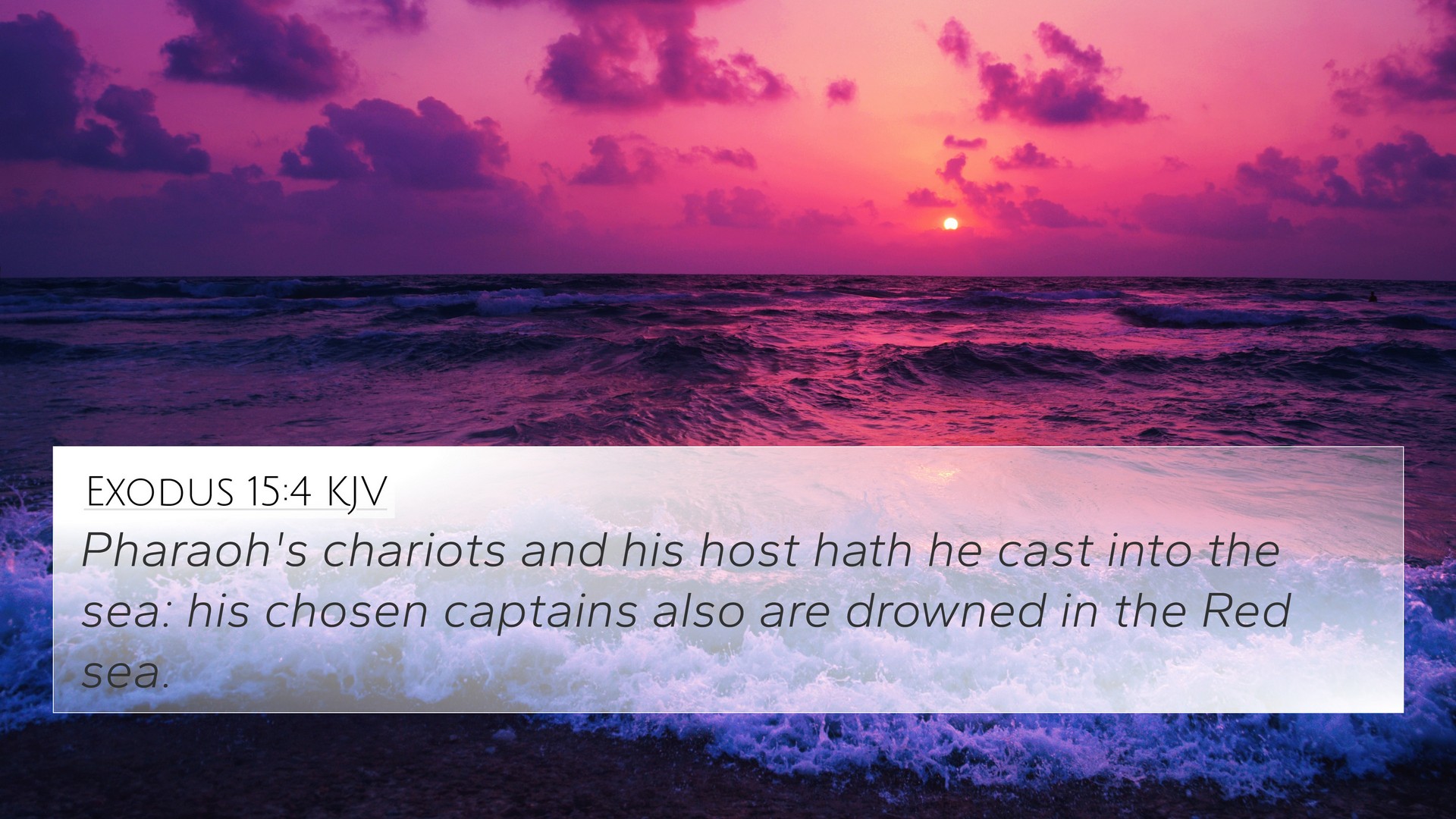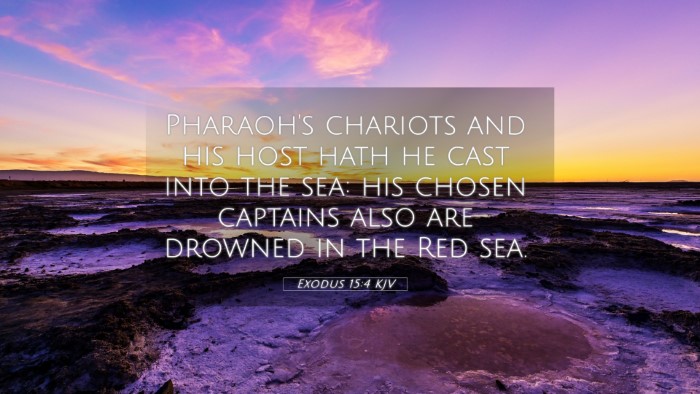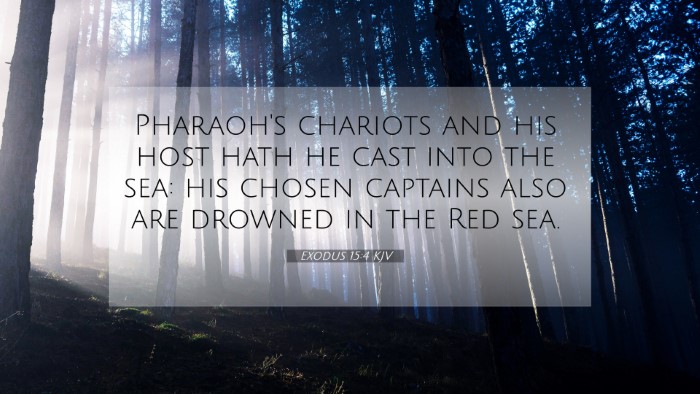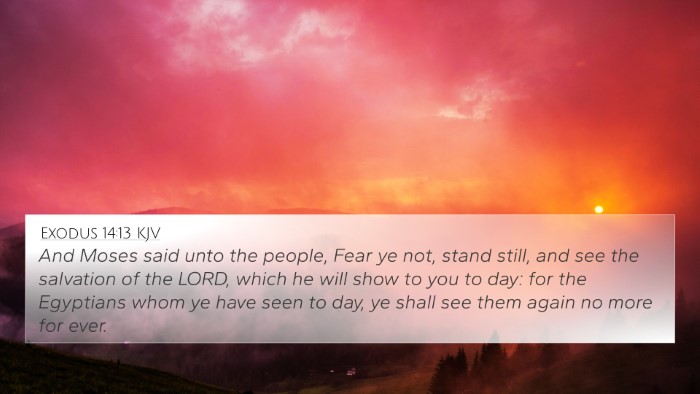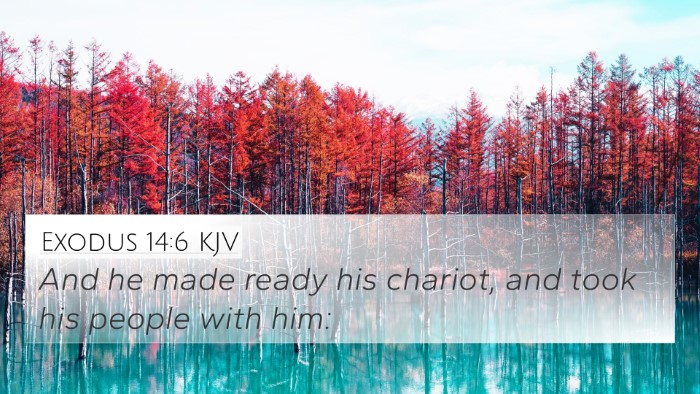Understanding Exodus 15:4
Exodus 15:4 states, "Pharaoh's chariots and his army he has cast into the sea; his chosen captains also are drowned in the Red Sea." This verse occurs in the context of the Song of Moses, a celebratory poem sung by Moses and the Israelites after their miraculous escape from Egypt. Here, we explore the meaning of this verse as well as its connections to other Biblical texts.
Verse Meaning and Context
The verse captures the dramatic deliverance of Israel from Egyptian oppression. The imagery of Pharaoh's chariots and his army sinking in the Red Sea symbolizes God's power and judgment upon those who oppose Him. This moment signifies the end of Israel's painful servitude and the beginning of their journey toward the Promised Land.
Commentary Insights
-
Matthew Henry:
Henry emphasizes the significance of this moment as a display of divine justice. The drowning of Pharaoh's army illustrates God's protection over His people and reinforces the belief that those who oppress God’s chosen will face His wrath.
-
Albert Barnes:
Barnes highlights the poetic nature of the verse, showing that it not only recounts history but also serves as a worshipful acknowledgment of God's mighty acts. He explains that through this deliverance, God demonstrated His supremacy over false gods that the Egyptians worshipped.
-
Adam Clarke:
Clarke discusses the historical and spiritual implications of this event. He notes that the drowning of Pharaoh's army symbolizes not just physical defeat, but spiritual victory for Israel, marking the start of their covenant relationship with God. It serves as a reminder of God’s faithfulness.
Thematic Connections
The connections between this verse and other Biblical texts enrich our understanding of its significance. Below are some highlighted cross-references that relate to Exodus 15:4:
-
Psalm 136:15: "But overthrew Pharaoh and his host in the Red sea: for his mercy endureth forever." This reiterates God's enduring mercy reflected in His judgment over Egypt.
-
Isaiah 43:16: "Thus saith the Lord, which maketh a way in the sea, and a path in the mighty waters." This verse reaffirms God's power to save and provides an assurance of His ability to lead His people.
-
Hebrews 11:29: "By faith they passed through the Red sea as by dry land: which the Egyptians assaying to do were drowned." This connects the faith of the Israelites in God's deliverance with the futility of their oppressors.
-
Deuteronomy 11:4: "And what he did unto the army of Egypt, unto their horses, and to their chariots... unto this day." This serves as a reminder of God's past actions to inspire future faith.
-
Revelation 15:3: "And they sing the song of Moses the servant of God, and the song of the Lamb." This passage connects the celebration of deliverance in Exodus to the New Testament, showcasing the enduring legacy of God's redemption.
-
1 Corinthians 10:1-2: "Moreover, brethren, I would not that ye should be ignorant, how that all our fathers were under the cloud, and all passed through the sea; and were all baptized unto Moses in the cloud and in the sea." An important New Testament reference to the spiritual significance of this event.
-
Romans 8:31: "What shall we then say to these things? If God be for us, who can be against us?" A profound reflection of the assurance that God protects and fights for His people, as shown in this historical account.
Practical Application and Reflection
As we reflect on Exodus 15:4, we are reminded of the power of faith and the assurance that God fights for His people. This verse invites us to consider the ways in which we can trust in God’s deliverance in our own lives. Whether facing personal struggles or broader societal challenges, the message remains clear: God protects and saves those who trust in Him.
Tools for Cross-Referencing
To delve deeper into the connections and meanings within the Scripture, consider using the following tools and methods:
- Utilizing a Bible concordance to find keywords related to deliverance and God's judgments.
- Employing a Bible cross-reference guide for systematic study.
- Engaging in cross-reference Bible study for in-depth exploration of themes.
- Using a Bible reference resource to identify thematic links across the Scriptures.
- Learning how to use Bible cross-references effectively in personal study and sermon preparation.
Conclusion
Exodus 15:4 captures a crucial moment in Israel’s history, showcasing God’s sovereignty and willingness to deliver His people. By exploring the connections between this verse and others within Scripture, we deepen our understanding of God’s nature and His promises. This verse does not stand alone; rather, it forms a vital part of the overarching narrative of God’s redemptive work throughout the Bible.
